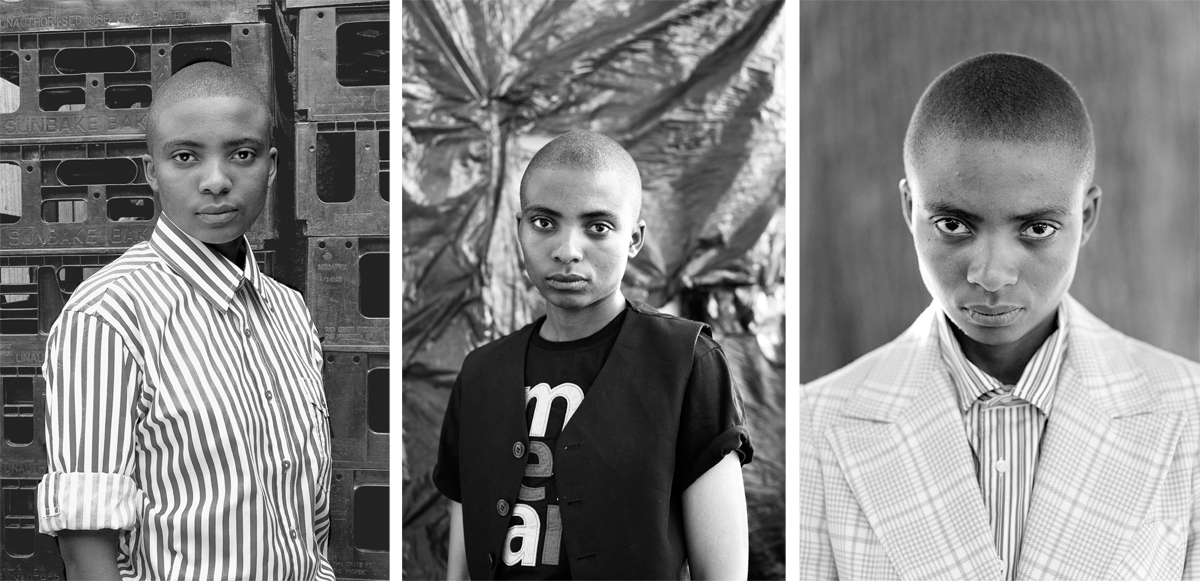Johannesburg
15 September - 14 October 2016Zanele Muholi
Faces and Phases 10

Lerato Dumse, Parktown, Johannesburg, 2013
Lerato Dumse, Syracuse, New York Upstate, 2015
STEVENSON is proud to present Faces and Phases 10, a special project by Zanele Muholi celebrating the 10th anniversary of her acclaimed portrait series documenting black lesbian and transgender individuals from South Africa and beyond.
Muholi’s 10-year celebration takes place just days after South Africa marks another milestone: a decade since the Civil Union Act was introduced in the National Assembly on 12 September 2006. The act, which was passed on 14 November 2006, legalised same-sex marriages and civil partnerships.
As an emerging artist at that time, Muholi was painfully aware of the lack of documentation of her community, and its absence from visual history, and this drove her to embark on her series of black and white portraits. Since taking her first image of Busi Sigasa at Constitution Hill, Muholi has captured more than 250 portraits, and is now producing follow-up images of her participants as they go through various phases in their lives.
‘The journey has been long and hard,’ says Muholi, paying tribute to the bravery of her participants, who she describes as ‘history makers who are positioned differently in politics, economy and in society’. Some of those featured in this exhibition were members of the Chosen FEW soccer team that Muholi accompanied to the 2006 Gay Games in Chicago.
Muholi notes that Faces and Phases’ 10th anniversary also coincides with 60 years since the historic Women’s March of 1956. ‘We are the children, grandchildren and great-grandchildren of those women who marched to the Union Buildings in Pretoria to challenge an unjust system. Were there lesbian women among that crowd? What narrative would they share with us today?’ she asks.
An archive of this magnitude is not built overnight, and Muholi admits that working on the series has been emotionally and physically exhausting. It has also brought her joy and fulfilment. For her, a highlight ‘is when participants meet in different places and spaces, when we travel together locally and abroad. I get excited when I see people presenting in different events and when we come together to share skills like during the Yithi Laba youth conference last year.’ Muholi has been able to witness the progress that has taken place in participants’ lives, as well as the emergence of new photographers through training workshops.
Setting out 10 years ago, Muholi described Faces and Phases as follows:
‘Faces’ express the person, and ‘Phases’ signify the transition from one stage of sexuality or gender expression and experience to another. ‘Faces’ is also about the face-to-face confrontation between myself as the photographer/activist and the many lesbians, women and trans(wo)men I have interacted with from different places …
Faces and Phases is an insider's perspective that both commemorates and celebrates the lives of the black queers I have met in my journeys. Some of their stories gave me sleepless nights as I tried to process the struggles that were told to me. Many of the women I met had been violated and I endeavoured not to exploit them further through my work. I set out to establish relationships with them based on a mutual understanding of what it means to be female, lesbian and black today. Faces and Phases is about our histories and the struggles that we continue to face.
These words continue to hold true. By showing some of Muholi’s initial portraits alongside others taken more recently, this celebratory exhibition will map the trajectory of each individual’s growth. Muholi will also introduce the audience to new participants, highlighting the fact that this is a living archive. Reflecting on the past decade, the award-winning Muholi states: ‘Faces and Phases is the only project in Africa of its kind. It is a success, milestone and record-breaker.’
Facebook: Faces and Phases
Twitter: @facesandphases
The exhibition opens on Thursday 15 September, 6 to 8pm.
The exhibition will take place in the Johannesburg gallery's fifth floor space.

